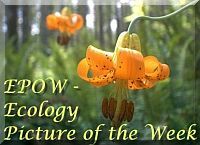Click on the image for larger version
|
|
Click on the image for larger version
|
Air Bubbles in Ice |
Credit & Copyright: Dr. Bruce G.
Marcot
|
Explanation: If you are feeling trapped by this year's holiday rush, consider these air bubbles, locked into the ice of frozen O'Dell Lake in the high Cascade Mountains of Oregon, USA. Far from mute, frozen bubbles can tell many interesting tales, especially if they are in glaciers and ice sheets. Climatologists take deep cores of ice around the world. Then in special laboratory conditions they slice segments of the core and study the composition of the air bubbles trapped within. The deeper the core, the further back in time the slices represent, so they can reconstruct prehistoric climates and track changes in atmospheric conditions. For example, ice cores from Greenland tell us that Earth's atmosphere has undergone rapid global changes many times in the past 110,000 years. But since the time that people have developed agriculture and industry, the climate has been the most stable and at least Greenland has been far warmer. Ice cores from the Andes Mountains of South America and the Himalayan Mountains of Asia suggest that the climate drastically cooled about 5,000 years ago but is now reversing to a warming trend within the last 50 years ... and that most of the world's high-elevation glaciers may melt in the near future. Ice cores from Antarctica have been drilled to over 3,600 meters deep (over 2.2 miles!). Studies revealed that greenhouse gases (CO2, methane, and other gases) trapped in the ice correspond with temperature variations, over a 420,000 year history ... perhaps warning us of current influences from our own activities that produce such gases. But it's unclear if the greenhouse gases caused the temperature increases or vice versa. However ... we are probably currently more concerned about our immediate holiday festivities than about the next hundred thousand years ... so from EPOW we wish all of you a happy, environmentally healthy, and ecologically interesting holiday season!
- Bruce G. Marcot and Tom Bruce |
Next week's picture: Stonecrop: Big Lessons From a Little Plant
< Previous ... | Archive | Index | Location | Search | About EPOW | ... Next >

Author & Webmaster: Dr.
Bruce G. Marcot, Tom Bruce
Disclaimers and Legal
Statements
Original material on Ecology Picture of the Week ©
Bruce G. Marcot
Member Theme of Taos-Telecommunity